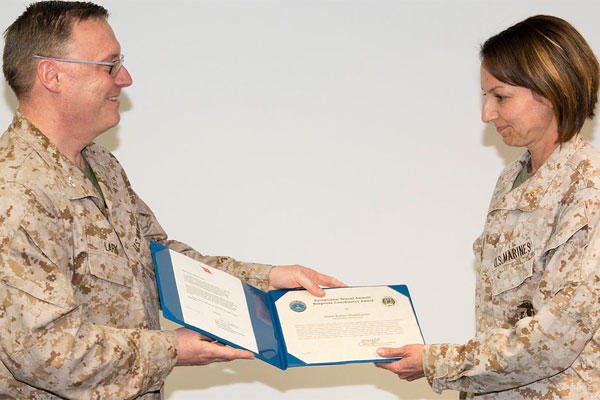GARMISCH-PARTENKIRCHEN, Germany -- An officer recognized as the top sexual assault response coordinator for the Marine Corps received her Defense Department-level award at the George C. Marshall European Center for Security Studies here May 10.
Marine Corps Maj. Robyn Mestemacher, stationed at Camp Pendleton, Calif., is one of six recipients of DoD’s Exceptional Sexual Assault Response Coordinator Award for 2012. She serves as the operations officer for the I Marine Expeditionary Force personnel branch, but is currently undergoing language training here at the Partner Language Training Center Europe. She speaks Russian and is also a Marine Corps foreign area officer.
Following her completion of the language course, Mestemacher received the award from Marine Corps Col. Philip Lark, Commandant of the Marine Corps chair of the Marshall Center. In early April, the Pentagon named Mestemacher and five others as top SARCs from a field of about 1,000 nominees. Mestemacher had not formally received the award due to travel and other duties.
Mestemacher, a St. Louis native with 13 years in the Marine Corps, accepted SARC duty on Feb. 1, 2012. As the SARC, Mestemacher served IMEF as a point of contact for integrating and coordinating sexual assault victim care. She was responsible for ensuring that a victim support system is in place that provides around-the-clock sexual assault response capabilities for all victims within their designated area of responsibility.
Mestemacher received the honor with mixed feelings.
“It’s a dubious distinction,” she said. “To have a need to recognize someone because they deal with sexual assaults so well is inherently a negative thing to me. I’m being rewarded because someone else is suffering for something.
"There are so many people out there who support this program who are doing great, great things that you never know anything about because of the nature of this program,” she continued. “I see what those people do every day, and to be able to bring attention to what it is that they are doing … that makes me very proud.”
In a congratulatory letter, Army Maj. Gen. Gary S. Patton, director of the DoD Sexual Assault Prevention and Response Office, lauded Mestemacher for her dedication.
“You play a critical role in the DoD’s efforts to prevent and respond to sexual assault,” Patton wrote. “We know that victims benefit greatly from the early and compassionate support that you provide. It is your hard work that will enable the department to accomplish its goal of eliminating sexual assault.”
Published in the January issue of the Marine Corps Gazette, Mestemacher’s article titled, “Sexual Assault: Change Something That is Wrong Through Aggressive Leadership,” highlighted challenges and steps the Corps could take to be more forward-leaning about the problem.
“Marines don’t need a sexual assault prevention and response program to tell them that sexual assault is bad; they already know that, and they don’t disagree,” Mestemacher wrote. “To truly change behaviors and attitudes about sexual assault in our Marine Corps, there must first be acknowledgement to a greater degree that there is a problem, that Marines should take personal ownership of the problem, and that we know and believe every one of us has the power, the voice, and the obligation to change something that is wrong.”
In his April 9 video message about Sexual Assault Awareness Month, Army Gen. Martin E. Dempsey, the chairman of the Joint Chiefs of Staff, singled out people like Mestemacher as being the first line of defense.
"You, who are serving at the pointed end of this thing. You, who are the captains, and the master sergeants; the lieutenants, and the staff sergeants; the ensigns, and the chief petty officers. You will have more to say about us solving this problem than I will because you'll see it, you can address it, you can stop it, and I need your help," Dempsey said in his message.
Marine Corps Lt. Col. Darren S. Boyd, assistant chief of staff for the IMEF personnel branch, said Mestemacher is a one-of-a-kind Marine who took charge of her role as a SARC and made it pay dividends.
“She really jumped into it,” Boyd said. “She improved the program immensely. It had been a program of monitoring and training. It turned into an active training and prevention program.
“Also, while she was performing as the SARC, she was also working very hard at working the multiple rotations IMEF has going into Afghanistan,” he continued. “She’s a phenomenal officer.”
Mestemacher finished her duties as the SARC at the start of the year, but that doesn’t mean she doesn’t carry some of that experience forward.
“If I can help to bring attention to the problem so eventually there’s no more problem, then that’s good, but having to know about all the dark side of human behavior is a very daunting thing to have to carry around,” she said.






























